Research Report: 7 Best Practices for Attorneys Adapting to COVID-19

To understand how the coronavirus pandemic is affecting the legal system, we surveyed attorneys and laypeople looking for legal help. Here’s what we found, and what we think lawyers should do for commercial success in a new era.
1. Embrace Virtual Communication
2. Secure Your Workspaces
3. Streamline Your Practice
4. Pivot Your Practice
5. Establish a Strong Online Presence
6. Focus Your Marketing
7. Stay—or Get—Tech Competent
The 2019 novel coronavirus remains first and foremost a medical issue. But health and safety considerations have led to new rules and norms about the way we live. For example, shelter-in-place orders, orders to wear masks, eviction bans, and foreclosure protections directly affect people’s lives in America.
COVID-19 has not only led to new laws—it’s jolted the legal system itself. Courts are backlogged, cases are stalling, and many attorneys are struggling to find clients. For example, fewer people are driving, which means safer roads but fewer DUI and auto accident cases. Similarly, as a product of the economic downturn, fewer small businesses require transactional help.
If you practice law, regardless of COVID-19’s direct impact on your business, there’s a good chance that you should—or will have to—make changes to adapt to the times. If a tradition as ingrained as the handshake could be gone forever, so too could some of the established ways we’ve thought about law practice and client relations.
At Martindale-Avvo, we’ve surveyed attorneys. We’ve also put many questions to the Nolo Network’s vast readership, specifically people looking for legal answers and legal help across various areas of law on AllLaw.com, CriminalDefenseLawyer.com, DrivingLaws.org, EmploymentLawFirms.com, and DivorceNet.com. We’ve looked at it all and boiled our research down to seven adaptations we think lawyers need to make.
Some of these forms of innovation might be new to small firms and solo practitioners. Others might not. Taken together, though, they represent a shift in the way that lawyers and clients think about legal services.
1. Embrace Virtual Communication
It’s safe to say people will always need the legal system. So much so that “justice trucks” have become a thing. But the way people access that system—courts, lawyers, and even the law itself—is changing dramatically. The United States Supreme Court, of all institutions, has gone virtual.
Whether it’s a client meeting, court appearance, or mediation session, there’s no substitute for in-person communication. But today’s technology offers a reasonable compromise given restrictions brought about by the coronavirus, in the form of video conferencing and other real-time communication.
Lawyers must be simultaneously well equipped for virtual communication and confident that their platforms are secure. They need to be prepared in this regard for both the short and long term, as all signs are that people won’t gather in person as much as they used to even after the pandemic subsides.
The good news is that clients seem to be comfortable with technology like video conferencing. More than half of our readers (54%) said they would be comfortable talking about their case with their attorney through video conferencing or by telephone.
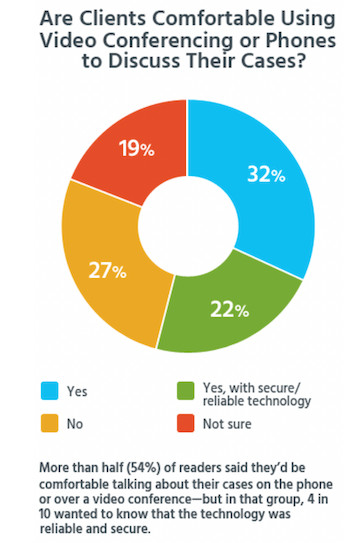
Virtual Legal Proceedings
A certain amount of virtual communication isn’t even up to attorneys these days; many courts have gone to remote appearances, at least for some matters.
The rapid transition to virtual appearances presents challenges, like how to allow people to “observe” proceedings without letting them interrupt (as one federal court judge can probably attest). Another issue is how to balance the presumptive advantage tech-savvy law firms might have over opponents with fewer resources.
It remains to be seen whether federal and state courts will adopt standardized virtual appearance procedures. Lawyers could have to learn how to use various platforms for various courts—indeed, emergency coronavirus rules have given most courts the discretion to decide how to conduct remote hearings.
For now, CourtCall remains a leader in virtual appearances. Some courts are also using Zoom, although the security of this platform has come into question.
Unfortunately, there’s no one-size-fits-all solution to replace all law-related in-person activity. Of particular concern to lawyers will be finding secure virtual communications platforms: Lawyers must use “reasonable efforts to prevent the inadvertent or unauthorized disclosure of, or unauthorized access to, information relating to the representation of a client.” (Rule 1.6, ABA Model Rules of Professional Conduct.) When communicating virtually, “reasonable efforts” means using security measures such as firewalls, passwords, and encryption.
Consider these tactics to safely and successfully communicate remotely. (And see below for more on the topic of information security.)
Phone calls
At a time when video conferencing consumes much of the focus for remote meetings, it’s worth remembering the value of the telephone in communicating with your clients. When we asked readers to tell us how their lawyers did (or didn’t) help them deal with the obstacles caused by the pandemic, the most common response was that they appreciated—or would have liked—an old-fashioned phone call.
“My attorney should have called me or had someone from the office follow up rather than just expect me to read an urgent email I didn’t notice for a week.”
–Reader from DelRay Beach, FL
While almost all clients are used to communicating by email, it’s worth considering that your clients could be more likely to notice and respond to a phone call, particularly for an urgent matter. As one of our readers commented, “My attorney should have called me or had someone from the office follow up rather than just expect me to read an urgent email I didn’t notice for a week.”
Even though phones continue to be effective communication tools, note that smartphones are less than ideal for client communications: Your phone battery can die, reception can be poor, and hosting conference calls can be challenging. Smartphones are also susceptible to spyware and hacking.
Think about signing up for a voice over internet protocol (VoIP) service. With VoIP, you can securely tap into your Internet connection for phone communications. Many VoIP services can be used to:
- Make unlimited phone calls
- Forward calls
- Host and manage conference calls
- Send and receive faxes
- Send and receive text messages
According to the ABA, the following providers are good VoIP options for lawyers:
Of course, there’s no reason to eliminate your mobile device altogether. One of the downsides of this technology is that, if you lose your Internet connection, you won’t be able to use your VoIP service (although there are ways to mitigate interruption). Plus, being available to clients sometimes means having a quick chat when you’re away from home or the office and available only on your cellphone.
Video conferencing
Being able to meet face-to-face with staff, clients, co-counsel, deponents, and courts can be vital to an attorney’s efficacy. But, whether due to COVID-19 or not, meeting in person is sometimes impractical if not impossible. And phone calls can’t capture facial expressions and visual presentations. That’s where video conferencing comes in.
Some video conferencing platforms for lawyers to consider include:
- Lifesize (offers conferencing, deposition services)
- GlobalMeet Collaboration for Legal (conferencing and billing software for legal professionals)
- Veritext Legal Solutions (focused on electronic depositions, but offers a wide range of tools for lawyers)
- Legaler (conferencing designed for lawyers with a focus on security)
Regardless of the virtual communication software or hardware you’re inclined to go with, be sure to do your research on the platform’s security and stability.
Live chat
Prospective clients voice the same security concerns as current clients: They want to be certain that the firm they are contemplating hiring will protect their confidentiality. Live chat on your website through a provider like Ngage Live Chat provides a secure mechanism to engage prospective clients and reassure them that you are both open for business and taking their privacy as a top concern.
Make sure your live chat provider’s data is housed in a secure data center and that they use industry-standard processes, including HTTPS, SSL, and data encryption. If you will be discussing medical issues with potential clients, also make certain that your provider is HIPAA compliant and understands how to handle personally identifiable information (PII).
2. Secure Your Workspaces
As you can already tell, digital security is a big issue right now. Somewhat understandably, it might not have been at the top of the list for attorneys when planning their offices, at least the ones they have at home.
But as teams stretch beyond the confines of the office, new and expanded opportunities for cybercrime have emerged. Especially now, lawyers need ways to securely send documents and information to their clients and manage information transfer within the firm. They need to make sure that everyone who does any work for the firm at home has a secure setup at home.
Data security isn’t just a matter of prudence and liability—it’s also something that many of your potential clients care about. In our survey, nearly four in ten readers expressed some level of concern about the privacy of what they might send to a lawyer electronically, while another two in ten weren’t sure about this issue. Similarly, of the readers who said they’d be comfortable talking about their case by videoconference or phone, four in ten wanted to know that the technology was reliable and secure.
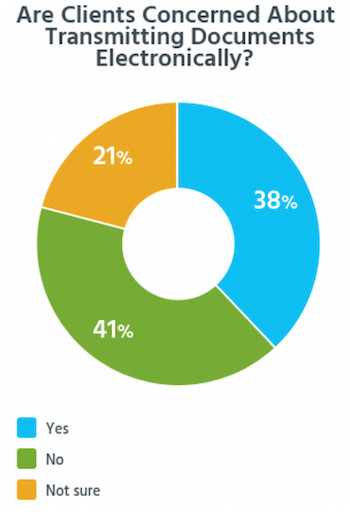
Here are some of the measures you should make sure are in effect for your practice, including, where applicable, at the homes of staff members:
- Password managers, so materials like work product and client files are password-protected
- Virtual private networks, better known as VPNs, which provide encryption
- Two-factor authentication for transactions
- Firewalls, which establish barriers between networks and the outside world
- Secure routers
- Encryption
- Physical security, like locks for laptops
- Anti-phishing programs
- Remote desktop protocol (RDP)
- Secure backup, storage, and transfer of files
3. Streamline Your Practice
Technology that assists lawyers with the practice of law has historically lagged behind other kinds of tech. But recent progress has been swift, to the point that in-market legal programs and applications can ease some of the burdens of working remotely, cut overhead, and facilitate client communications.
Today’s legal tech has a lot to offer when it comes to practice management (think billing, calendaring, client intake, and the like) and client assistance (think ease of communication and information transfer).
Law firm management technology
The days of lawyers manually comparing daily planners and keeping time records using Word are—or should be—long gone. Automation and simplification save time and reduce overhead. Here are a number of management tasks for law firms that can be automated or simplified through technology:
- Calendaring
- Timekeeping
- Receptionist assistance
- Billing
- Client intake
- Document management
Fortunately, quite a few businesses offer a bundle of services that handle several of these tasks, meaning you might find one provider that meets many or most of your administrative needs. Here are a few of the most widely used services (note that many of these services are offering free or reduced-fee trials to help lawyers affected by COVID-19):
Esignature software like DocuSign, HelloSign, or Adobe Sign is another good indicator of a tech-competent, streamlined practice. It’s also an excellent way to reduce in-person interaction. Once considered a risky and even unacceptable practice, electronic signatures are now a legitimate option in most courts and recognized as valid by most state legal systems.
And many of your clients will already be used to this technology; in fact, more than half of our survey respondents (53%) said they were comfortable signing documents electronically; another 18% simply weren’t sure (which presumably means they could be convinced once they understand how it works).
Client assistance technology
Technology can have huge benefits for a practice not only in day-to-day management but also in client relations. If you haven’t contemplated it before, now is the time to think about ways that you can supplement and enhance your tech-based client offerings.
Busy work
Especially when it comes to solo practitioners and small firms, letting clients handle some of the busy work can be a time and money saver. For example, a lawyer could, on the one hand, set up an hour-long meeting during normal business hours to go over clients’ assets for inclusion in an estate plan. On the other hand, if the attorney had a custom app, the clients could answer questions related to their situation and fill in vital information on their own time. (Check out Community Lawyer, a service that assists lawyers in creating their own apps and client forms.)
Of course, there will still be regular occasions for face-to-face meetings, whether in person or by video conferencing. In our estate planning example, the lawyer could very well arrange to meet with the clients and work out remaining details and questions after reviewing the information they’ve provided.
Outside-the-box communication
For many clients who are facing the same work-from-home challenges that you are, picking up the phone and having a private conversation is next to impossible. Look into ways that you can enable clients to communicate with you outside of normal business hours or via not-so-traditional methods. For example, you could hire a virtual legal receptionist, set up encrypted text messaging, or offer an online chat service.
Easy information transfer
Many lawyers have had success with client portals. Through them, clients can create an account on the lawyer’s website, and then use that account to view invoices, securely send documents, and access those and other materials.
Many of the practice management tools noted above can be used to create a client portal, or your web developer can advise on how to best set one up.
4. Pivot Your Practice
The coronavirus pandemic has severely interrupted if not upended many legal practices—especially those centered around areas of law where clients can put off their matters or where underlying conditions have been fundamentally disrupted (think driving as it relates to DUI). Components of the legal system grinding to a halt has forced many firms to lay off attorneys and staff, while solo practitioners who aren’t working aren’t getting paid.
Not as a knee-jerk reaction, but rather as a prudent measure to adapt to a changing world, many lawyers are looking to diversify their practices if not altogether change focus. Of the attorneys we surveyed, 42% indicated they were considering adding at least one practice area that they weren’t practicing before COVID-19. In fact, 21% had already added one area or more.
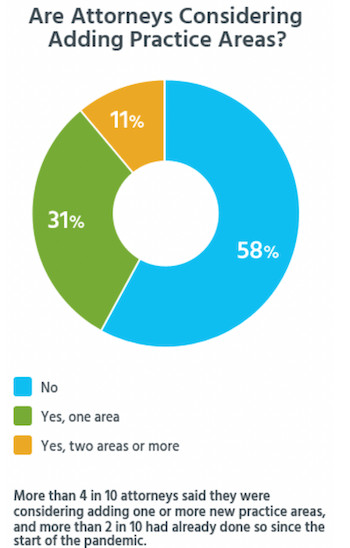
One the one hand, this kind of change won’t come easily, as diversifying a practice will require some serious retraining. On the other, there are plenty of resources for attorneys looking to retrain, and lawyers generally have a set of skills that’s more transferable than they might be inclined to think.
Finding a focus
Before jumping in, practitioners attempting to diversify should think about what practice areas are needed in times of crisis, as well as the extent to which they can apply their current skills and knowledge to those areas.
Resilient areas of practice
Not all practice areas have suffered at the hands of the coronavirus—some have floated to the top in downtimes, including bankruptcy law, unemployment practice, and family and divorce law. We are also likely to see, if not already seeing, a surge in legal work related to:
- Estate planning and succession, due to concerns brought about by mortality rates
- Disability law, resulting from long-term effects of the virus and a suffering economy
- Insurance litigation, as more businesses and individuals make claims on policies to compensate for virus-related losses
- Workers’ comp and employment law, as businesses and employees try to navigate illness, furloughs, layoffs, and changing benefit packages
- Causes of action alleging that employers and businesses failed to protect the health and safety of employees and patrons
Of course, you’re not going to decide to pick up a new practice area on a whim. And even if you do add one or refocus your current practice, you’ll need time to retrain and build business, by which point the landscape could have shifted. So be sure to think both short and long term. Look to the news, reports of emerging legal trends, and the economy in general for guidance on where to refocus.
Transferable skills
The good news is that all lawyers, due to their time in law school and having studied for the bar exam, have the foundation to practice in any area of law. Add the fact that areas of the law overlap, and most attorneys have a skill set that can realistically translate to a new law-practice endeavor. For example, perhaps a lawyer who has focused on business formation could pivot to advising companies on finding resources to stay afloat, helping them renegotiate commercial leases, and assisting any in need of dissolution.
Lawyers can even call on their current clients for inspiration. Consider checking in with your clients about the legal challenges they are facing in their personal and professional lives. Maybe touch base with them individually by phone or collectively through a private email survey. Hopefully, some themes will emerge in their responses, giving you clues about how to adapt your practice.
Learning the law
Bar associations, practice groups, continuing legal education programs, and even universities can be good sources for learning about new areas of law. Your focus, of course, will be on both the rules and the practical information necessary for your practice.
Consider the following resources for pursuing your new area:
- Solo Practice University. Although focused on helping attorneys set out as solos, it also offers courses on how to practice specific areas of law.
- Your alma mater. Does your law school allow alumni to sit in on classes, virtually or otherwise? For example, UC Berkeley School of Law offers Berkeley Boosts, a monthly series of free webinars and articles for legal practitioners.
- Online classes at other law schools, like Harvard Law.
- The American Bar Association’s Career Choice Series.
- SlideShare, a website where members can upload presentations, infographics, and documents on a variety of topics. A search for “law,” reveals thousands of opportunities to learn about new subjects (be sure to vet the source of the presentation, though). Also check out LinkedInLearning, a related online learning platform.
- Nolo books and articles. Nolo’s products are designed for nonlawyers, but we’ve learned that attorneys use them all the time. We might be biased, as Nolo is part of the Martindale-Avvo family, but we don’t think there’s a better resource out there for people looking for practical guidance. (Many Nolo books come with forms that practicing attorneys can use.)
- Lawyerist Lab, a year-long online “boot camp” for lawyers looking to reboot and innovate their practice
Another angle to consider: If you’re able to successfully market your new venture but lack confidence in your ability to fully serve clients, think about hiring a freelance attorney to assist you. With massive layoffs, many lawyers are looking for gig work to get them by; you might just find someone who has the knowledge and experience you need to help you transition.
You can find freelancers through websites like Upwork, Montage Legal Group, Hire an Esquire, and LawClerk. The online classifieds for your state bar association are another option, as is letting your professional network know that you’re looking for assistance.
5. Establish a Strong Online Presence
Remember when simply having a website felt like enough of an online presence for a practicing attorney? These days, lawyers are expected to have clean sites that look just as good if not better on mobile devices and load quickly. But a smooth site isn’t the end of the story.
Online directories like Avvo, Lawyers.com, and Justia significantly expand the reach of a lawyer looking for business. So can effective social media engagement. Whether it’s a directory or a professional networking site like LinkedIn, the yield depends heavily on the lawyer’s level of participation. Especially in times like these, it’s critical to send signals to the public that you’re ready to help.
The stronger your presence across multiple platforms and sites, the more likely it is that clients will find you and know that you’re ready to help them. In fact, of the readers in our survey who expressed concerns about hiring an attorney during the pandemic, more than half (57%) mentioned issues that could be addressed by a strong, active online presence. Nearly a quarter (22%) were worried that they might not be able to find a lawyer who was open for business, while more than a third (35%) were apprehensive about finding a lawyer who would give close attention to their case in times like these.
(The results shown below total more than 100% because readers could choose more than one answer.)
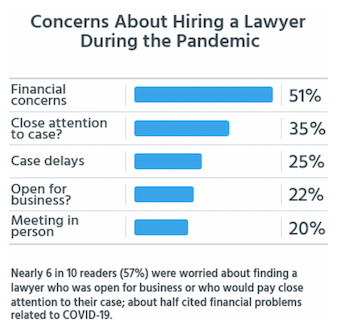
You might want to speak to these concerns on your website and other platforms—for instance, by detailing how you’re addressing the challenges of communicating with clients and moving their cases forward during the pandemic. For example, Avvo and Lawyers.com provide “Open for Business” and “Offers Virtual Consultation” badges for attorneys to display on their profiles. (More on directories below.)
Here’s some more to think about when it comes to putting the best version of your business forth on the Internet.
Crafting your website
It’s clear: Now is the time for attorney websites to evolve. A one-page site with a CV and contact information probably won’t inspire prospective clients to get in touch. And, absent considerable spending on advertising, it’s unlikely they’ll even find that kind of site in the first place unless they’re specifically looking for the attorney in question.
To make your website deliver on your time and investment, consider creating a site that doesn’t merely provide information about your practice. Think instead about setting it up so that you can also use it for client management and marketing. You’ll be able to automate some of your client processes and manage your marketing in a streamlined, professional manner. And do make sure that your site is mobile-friendly and loads quickly.
Resources when it comes to your site include:
Attorney directories
In Hiring an Attorney 2019: Legal Consumer Choices; Client Expectations, Martindale-Avvo reported on how legal consumers find their attorneys. Of the polled consumers, 47% used online review sites and directories such as Avvo, Lawyers.com, Justia, and Lawline.
These kinds of services allow attorneys to post much of the same information that they would on a website, such as contact information, years of experience, and education. In addition, they often allow clients to rate their experience with the attorney. They also typically offer attorneys the option to blog and answer legal questions on the platform. Plus, links from an authoritative attorney directory like the ones we’ve mentioned can drive traffic to your own website.
Attorney directories are a low-investment, high-return proposition for many users, with yield having to do significantly with participation level. Lawyers who really engage with the platform—as by filling out a profile, answering questions, and blogging—have a better chance of reaching a lot of potential clients.
Social media
Though a tricky forum, social media can be crucial for lawyers. True, the ease of sharing information and interacting with users poses potential ethical pitfalls, but lawyers who are mindful of the rules can confidently tap into a free, bountiful resource. The data shows that consumers check social media to research lawyers. And we know that a strong social media presence can attract prospective clients even off the relevant forum, through simple Google search.
Nivan, an online marketing manager for legal and healthcare professionals, recommends lawyers use the big 5 social media platforms to begin:
Taking full advantage of even just those five could feel like a full-time job, but don’t let the sense of overload discourage you from taking part at all. That you can use all these platforms (and many, many others) doesn’t mean you should. Take your time to learn where your potential clients gather, then participate where it makes sense.
6. Focus Your Marketing
As you would expect, most of the attorneys we surveyed reported a drop in revenue owing to the coronavirus outbreak. While 95% of the attorneys we surveyed indicated they are still open for business and accepting new clients, more than 80% indicated that their revenue has dropped. Some have had to reduce employees’ pay or let them go altogether. Most who have taken a financial hit (73%) believe it will take six to 12 months for business to return to normal.
For these attorneys and others looking to stabilize revenue and position themselves for growth, effective marketing is key.
Personal approach
We’ve found that potential clients are still interested in the personal touch—even if it’s not in person.
Our survey also showed that most readers (56%) wouldn’t be comfortable hiring a lawyer they hadn’t met in person, although more than a third (35%) would be satisfied if they had another form of electronic communication with the attorney first (the favored method being video conference). Fewer than one in ten would be comfortable with remote hiring if they had merely communicated electronically with the attorney’s representative.
Your area of practice might affect your prospective clients’ openness to hiring you without an in-person meeting. Readers with personal injury or immigration issues were somewhat more likely to indicate they would be comfortable hiring a lawyer after only a video conference or phone call with the attorney; those with criminal issues were the least open to the idea of remote hiring.
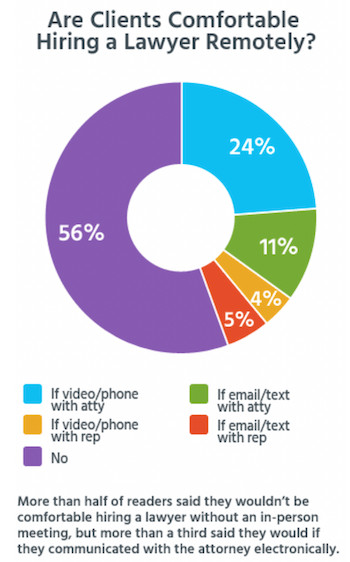
Again, you should give thought to using your online presence, in this instance to assure potential clients that they’ll get a chance to know you and that you’ll also keep them safe. You might, for instance, want to describe your cleaning and social-distance practices once you reopen your physical office, and how you use video conferencing for consultations and case evaluations.
Traditional networking
Marketing certainly goes hand in hand with and is sometimes inextricable from online presence. Defining a target audience, engaging with social media and directory platforms, and creating blog and article content can all qualify as marketing. To us, though, marketing also encompasses classic networking, albeit with more of an electronic and less of a person-to-person slant these days.
Consider reaching out to existing clients and those you have worked with in the past year or so, even if just to see how they’re doing. Sometimes a gentle reminder that you’re still out there is all it takes to prompt clients to hire you for new work or to send referrals your way. This kind of human contact can benefit just about any practice, from a solo estate planner who touches base with someone who needed a will a year ago to big-firm partners who reach out to the in-house counsel they worked with on a big summary judgment motion.
But don’t make the mistake of checking in electronically, especially en masse. We’re all overwhelmed with “Coronavirus Update” emails from every company that ever got ahold of our email addresses. Stand out from the crowd by leaving a sincere voice mail or sending a handwritten note or holiday card (supporting the U.S. Postal Service while you’re at it).
Otherwise, join networking groups, organizations in your practice area, and professional groups. Let friends and family know you’re open for business and accepting new work, and make sure your digital presence—particularly your website and directory profiles—indicate the same.
Remember that traditional networking is complementary to, rather than a substitute for, other kinds of marketing and online engagement. Your reach through the Internet is going to be broader even if less direct, and you can rest assured that potential referral sources and clients will be looking you up online.
Expanding your reach
Of course, when you ramp up your online presence, you have the potential to reach people worldwide. But having fans in Abu Dhabi likely won’t help your practice if it’s in Allendale. Whom you target and how depends on your type of practice. If you’re a solo family law practitioner, your market is going to be local. If you’re a partner at a national firm doing federal appeals work, you have a wider net to cast.
As you evaluate ways to reach your intended audience, keep in mind that you don’t have to do it all yourself. You might even want to consider working with a marketing firm that focuses on law practices, including ones in your practice area(s).
Finally—and this is the part where many lawyers tune out—start writing. That could mean blogging, drafting articles for a local or national publication, or answering Q&As on an attorney directory site such as Avvo. Wherever you do it, when you write about your practice area, you put yourself out there as a reliable source on a topic. As you establish trustworthiness and credibility, it becomes easier for potential clients looking for the type of assistance you’re offering to find you.
7. Stay—or Get—Tech Competent
If there’s anything that causes attorneys to shudder more than the notion of carving out time for a blog post between motions with hurtling deadlines, it could be technology. Like it or not, though, competence in technology is now absolutely necessary for lawyers at all levels of practice. Attorneys simply need to be able to use emerging products and platforms.
Sure, with determination, a fair amount can be learned on the fly. But partners in law firms should start to feel very uncomfortable if they’re still having to hand off to associates tasks that require the use of technology. And any other practitioners who even jokingly refer to themselves as Luddites need to know that the ABA Model Rules of Professional Conduct call for technological competence, with many states having adopted similar rules. (See Rule 1.1, comment 8, ABA Model Rules of Professional Conduct.)
Don’t worry—you don’t need to add a coding class to the curriculum as you try to learn a new area of law or how to develop a digital presence. But you do need to engage with technology when appropriate.
Websites, blogs, and even social media accounts offer all kinds of ways to learn about technical developments as lawyers deal with COVID-19-related challenges to the practice of law. Below are just a few of the great resources we’ve found for inquiring attorneys.
- MyShingle.com
- Lawyerist
- Stanford’s CodeX: FutureLaw 2020
- The Modern Lawyer Podcast
- Collective Campus
- Institute for the Future of Law Practice
- Future Law
- The Senate
- LawyerExpress
Thinking for the Future
We’ve given you a lot to consider, and pursuing the approaches we’ve covered here will take time. So the last thing you probably want is to be asked to think about what happens if the coronavirus comes back in some shape or form months or years down the road.
For better or worse, it makes sense to consider what will happen if COVID-19 or something nearly as pervasive hits your firm particularly hard in the future. What if it impacts your practice not only when it comes to the bottom line but also in terms of the health and well-being of your staff?
By doing what we’ve outlined here, we think you’ll be well situated to weather future storms. As a parting thought, though, we hope that you’ll stretch your thinking about guarding the legal interests of your clients (as through contingency planning) and implement measures to protect your employees given the new reality.
We encourage you to keep safety at the forefront, and to take time for your own health and happiness.









